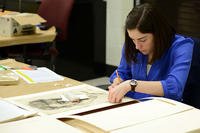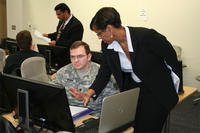Alissa is a Marine Corps spouse who fought hard to hang on to her career as a teacher through three moves in a four-year timeframe.
We know how hard it can be to pursue a career in teaching with the licensing issues, but Alissa has done it and landed jobs that make her happy, too.
Related: Search for Teaching & Education Jobs.
She's currently a first-grade teacher with military transition on the horizon, and we asked her to tell us how she balances teaching and military life, and what she's doing to ensure career success in the future.
What do you like best about your job?
I love seeing children excited about learning and the looks on their faces when they finally understand a concept with which they've been struggling.
I also like the support system of teachers and the friendships I've made at the school where I teach.
How did you get your current job?
I emailed and dropped off resumes to principals, as well as attended a job fair.
Did you tell your prospective employer that you are a military spouse?
I generally do mention the fact that I am a military spouse, mostly because it helps the employer understand why I may only have a year of experience somewhere before moving on to a different position.
I gauged the timing of telling them based on how the interview was going, but I was always honest about it.
I don't think it really affected whether or not I was offered a position. There are a lot of military spouses in the teaching field, and I think most schools are used to the pretty consistent rotation of some staff members.
How has being married to a service member impacted your own career? How did you get around that?
Due to my husband being in the Marine Corps, I have not had as much consistency with teaching positions as I would like.
Related: Does your resume pass the 6-second test? Get a FREE assessment.
I started out as a substitute teacher, then had a break where I didn't work at all because we were in a location for such a short period of time because of his trainings. Once he finally entered the fleet and we settled down, it was a lot easier to find a full-time position.
Thankfully, teaching is a career that can go anywhere so, despite moving three times in the last four years, I have been able to further my own career and help provide for my family.
What one piece of advice would you give to military spouses who want to balance volunteer work and professional work?
I would tell those spouses to learn to say no. I have such a passion for teaching and put a lot of time and work into it.
I also really enjoy volunteering and have struggled to find a balance between the two. I want to be able to say yes and do everything to be involved and help others, but I found that I was wearing myself too thin.
Related: The Military Spouse Employment Manual
Focus mainly on your professional work, but find one or two areas in which to volunteer regularly to keep yourself sane.
How does your service member support your career?
My husband has been very supportive of my career throughout our time in the military. He helped me with my resume and looking for positions when I was in the application process.
He will cook dinner on evenings when I have a lot of school work and/or lesson planning to do.
Additionally, he has been verbally appreciative and understanding of the fact that even with the challenges of my career coming second to his, I still choose to pursue teaching and working full time.
What is the biggest career mistake you made?
When we first moved to North Carolina, I was offered positions at two different schools. My gut was telling me to take one position, but I accepted the other because of the glamour of a new school.
The experience there was awful, but valuable in that it taught what I don't want in a position. Thankfully, the other school was still interested in hiring me the next school year, and I have loved being with them the last two years.
What is the one strength you use on the job every day?
A strength I use daily is patience. Educating 19 six- and seven-year-old's takes a lot of coordination, vigilance and patience.
Even with routines and expectations in place, young children still push boundaries or have rough days. My high level of patience allows me to redirect the children and teach them how to properly handle negative situations without anger and yelling.
What are your favorite qualities in a co-worker?
As a teacher, one of my favorite qualities in a co-worker is openness -- openness to sharing teaching ideas and strategies, openness to ask for help and guidance, and openness to share both successes and frustrations in the classroom.
What was the hardest lesson you needed to learn about work?
The hardest lesson I've learned about work as a military spouse is to be flexible.
Currently, I am applying to counties in two different states because we don't yet know which of those two places we are going.
It can get frustrating putting in extra effort knowing half of it will have been a bit of a waste, but the military community is really supportive and makes the extra effort worth it.
What keeps you working?
I know that teaching is what I was called to do and it is my passion, so that's my main motivation to keep teaching. I know that I am a positive influence on children and am able to help them learn and grow, not just academically, but socially and emotionally as well.
What is your version of happily ever after?
My version of happily ever after is my husband getting out of the military, we move home to Colorado where both our families are, and we start a family of our own.
Related: For the latest veteran jobs postings around the country, visit the Military.com Job Search section.
Looking for more job tips?
Sign up for a free Military.com membership to have military news, updates and job resources delivered directly to your inbox.























